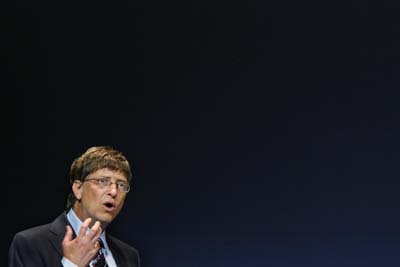Gates offers $3 software for students
By Andrew London and Liu Baijia (China Dialy)Updated: 2007-04-20 07:14
Bill Gates Thursday promised to offer a $3 Microsoft software package to poor students both in developing and developed countries.
 Microsoft Chairman Bill Gates delivers a speech during The Microsoft Government Leaders Forum in Beijing April 19, 2007. [Reuters]  |
"Education is the most important investment for the future," Gates said on his 10th visit to China. His pledge comes five months after Intel Chairman Craig Barrett said during his China visit that the global giant would start selling computer chips for $300 in the country from this year. Like Gates, Barret's aim, too, is to help poor people access IT.
Starting from the second half of this year, the world's largest software firm will provide its software, including Windows XP Starter, Microsoft Office Home and Student 2007, Microsoft Math 3.0, Learning Essentials 2.0 for Microsoft Office and Windows Live Mail desktop for $3.
Countries interested in the program, however, will have to pay at least half of the cost of the computers for the students.
The program does not include only developing countries, but also developed ones that want IT access for their poor students, Microsoft Vice-President Will Poole said.
Professor Mohammed Yunus, founder of the famous micro-credit organization, Grameen Bank (Rural Bank) in Bangladesh, and 2006 Nobel Peace Prize winner, agrees that IT plays a key role in alleviating poverty.
Speaking at Tsinghua University, where he received an honorary doctorate, Gates said:"Software isn't just for a few but really about empowering everyone" - whether they are displaced or migrant workers or the visually impaired trying to use a computer.
Contrary to Russian cosmonaut Fyodor Yurchikhin's claim, Gates said he has no intention of venturing into space. Instead, the world's richest man wants China's poorest to one day enjoy the benefits of the digital revolution.
"We want to make sure digital advances are available to all," Gates said, referring to Microsoft's links in China, specifically Beijing-based Microsoft Research Asia (MRA), a creative research lab that focuses on cutting edge advancement in computer technology.
"We've only just scratched the surface of the digital revolution," he said. One day, people should be able to enjoy all TV programs online, and a digital tablet, connected without a wire to the Internet, could replace classroom textbooks, Gates said.
Tsinghua University has been one of the talent breeding grounds for the MRA since 1998. It was set up after Gates visited China and was impressed by the "talent, enthusiasm and creativity" of Chinese university students.
Gates also announced a new joint venture between the university and the MRA: the Tsinghua-Microsoft Special Pilot CS Class, a faculty exchange program.
|
||
|
||
|
|